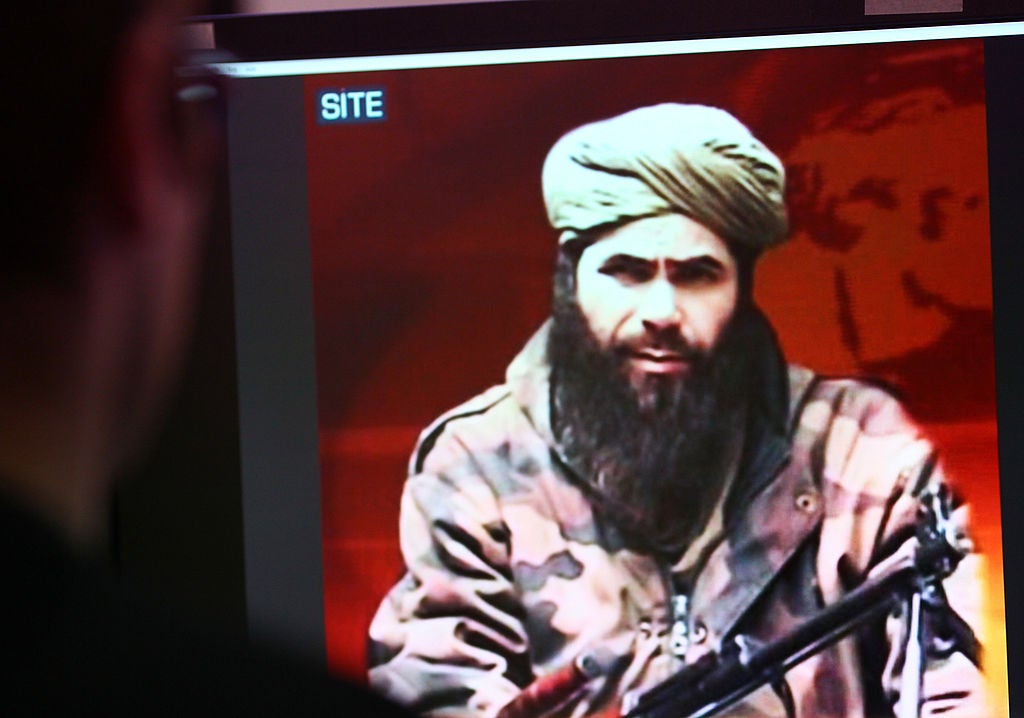Abdelmalek Droukdel dead: Al-Qaeda’s leader in North Africa killed by French forces, government says
Militant's death would present major victory for country after years of fighting jihadists in the Saheel

Your support helps us to tell the story
From reproductive rights to climate change to Big Tech, The Independent is on the ground when the story is developing. Whether it's investigating the financials of Elon Musk's pro-Trump PAC or producing our latest documentary, 'The A Word', which shines a light on the American women fighting for reproductive rights, we know how important it is to parse out the facts from the messaging.
At such a critical moment in US history, we need reporters on the ground. Your donation allows us to keep sending journalists to speak to both sides of the story.
The Independent is trusted by Americans across the entire political spectrum. And unlike many other quality news outlets, we choose not to lock Americans out of our reporting and analysis with paywalls. We believe quality journalism should be available to everyone, paid for by those who can afford it.
Your support makes all the difference.Al-Qaeda‘s leader in northern Africa has been killed in a French military operation, France’s government has announced.
Florence Parly, the country’s defence minister, said Abdelmalek Droukdel and several of his allies were killed on Wednesday in northern Mali by French forces and their partners.
It was not clear how his identity was confirmed by the French, but it would be a major victory for the country after years of fighting jihadists in the Sahel.
There was no immediate confirmation of his death from al-Qaeda in the Islamic Maghreb, known as Aqim, which has made millions of dollars abducting foreigners for ransom over the years and made large swaths of West Africa too dangerous for aid groups to access.
Related anti-terrorist operations in the region also led to the arrest on 19 May of a major figure in the Islamic State in the Greater Sahara, Mohamed el Mrabat, she said.
“I congratulate and thank all those who have enabled and carried out these daring operations, which severely strike these terrorist groups,” Ms Parly tweeted in French late on Friday. ”Our forces, in cooperation with their G5 Sahel partners, will continue to track them relentlessly.”
Droukdel’s reported death comes after French president Emmanuel Macron and the leaders of the G5 Sahel group – Mauritania, Mali, Burkina Faso, Niger and Chad – launched a new plan in January to fight jihadists in the area.
France deployed 600 additional soldiers to its Barkhane force, raising the number of troops there to 5,100.
In a March video released by the extremist monitoring group Site, Droukdel urged governments of the Sahel region to try to end the French military presence, calling the troops “armies of occupation”.
It was not clear how long Droukdel had been in Mali, Algeria’s southern neighbour. For years he was thought to be holed up in the Kabyle region east of the capital of his native Algeria, and many people had questioned why he was never captured by Algerian security forces, which had honed their counterterrorism skills over the decades.
He was widely seen as the symbolic leader of al-Qaeda’s North African branch, whose operational centre for attacks shifted to northern Mali over the past decade.
That led to the French military invasion of the region in 2013 seeking to counter Islamist extremist designs on southern Mali and the capital, Bamako.
Droukdel made his reputation as a feared extremist leader in Algeria, which beginning in the early 1990s was convulsed by violence in what the nation now calls the “black decade”.
Droukdel’s al-Qaeda affiliate had claimed responsibility for numerous deadly suicide bombings in Algeria, including targeting a United Nations building in Algiers in 2007, shattered by a vehicle packed with explosives.
Droukdel, also known by the nom de guerre Abu Musab Abdul Wadud, transformed the Salafist Group for Call and Combat, known as the GSPC, into al-Qaeda in the Islamic Maghreb, spreading the movement across Africa’s Sahel region under the umbrella of the global terror network.
More recently he had been commanding all the al-Qaeda groups in North Africa and the Saheel, including Nusrat al-Islam, which has claimed responsibility for devastating attacks on the Malian military and UN peacekeepers trying to stabilise the volatile country. Ms Parly identified him as a member of al-Qaeda’s “management committee”.
Join our commenting forum
Join thought-provoking conversations, follow other Independent readers and see their replies
Comments